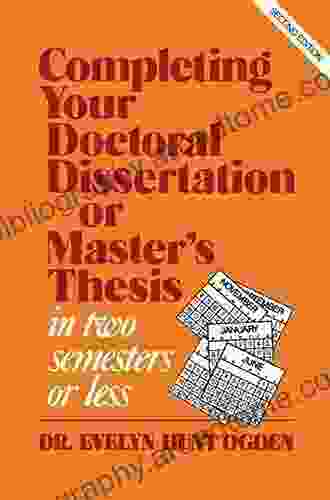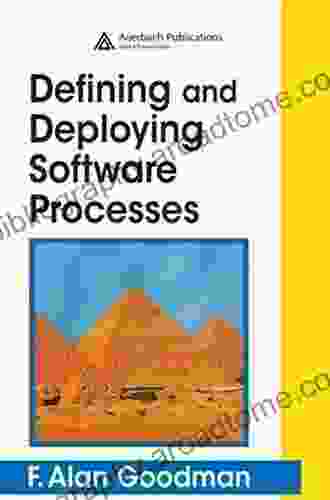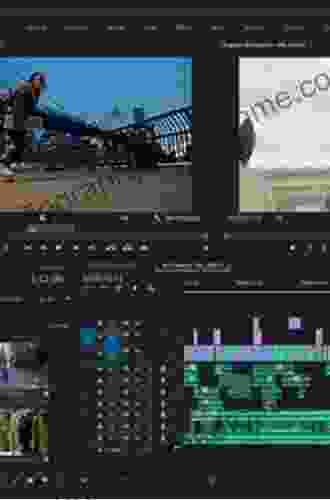Complete Your Doctoral Dissertation or Master's Thesis in Two Semesters or Less: The Ultimate Guide

If so, then this comprehensive guide is for you. In this article, we will provide you with everything you need to know to successfully complete your dissertation or thesis in a timely manner. We will cover topics such as:
- Choosing a topic that is both interesting and manageable
- Developing a research plan that will keep you on track
- Writing a strong proposal that will get you approved by your committee
- Conducting research efficiently and effectively
- Writing a dissertation or thesis that is both well-written and academically sound
We will also provide you with tips and advice from experts in the field who have successfully completed their own dissertations and theses in two semesters or less.
So if you are ready to take control of your dissertation or thesis and finish it in record time, then keep reading.
4.6 out of 5
| Language | : | English |
| File size | : | 1669 KB |
| Text-to-Speech | : | Enabled |
| Screen Reader | : | Supported |
| Enhanced typesetting | : | Enabled |
| Word Wise | : | Enabled |
| Print length | : | 160 pages |
The first step in completing your dissertation or thesis is to choose a topic. This is a crucial step, as your topic will determine the scope and direction of your research.
When choosing a topic, it is important to consider the following factors:
- Interest: You should choose a topic that you are genuinely interested in. This will make the research and writing process more enjoyable and motivating.
- Manageability: Your topic should be manageable within the time frame you have available. Avoid choosing a topic that is too broad or complex.
- Relevance: Your topic should be relevant to your field of study. It should also be original and contribute new knowledge to the field.
Once you have considered these factors, you can begin brainstorming possible topics. A good way to do this is to talk to your advisor, read relevant literature, and attend conferences in your field.
Once you have a few potential topics in mind, you can start to narrow down your choices. Consider the following questions:
- Is the topic interesting to you?
- Is the topic manageable within the time frame you have available?
- Is the topic relevant to your field of study?
- Is the topic original and will it contribute new knowledge to the field?
By answering these questions, you can choose a topic that is both interesting and manageable, and that will help you to achieve your research goals.
Once you have chosen a topic, you need to develop a research plan. This plan will outline the steps you will take to complete your research and writing.
A research plan typically includes the following elements:
- A statement of your research question or hypothesis
- A review of the relevant literature
- A description of your research methods
- A timeline for completing your research
Developing a research plan will help you to stay organized and on track throughout the research and writing process. It will also help you to identify any potential roadblocks and develop strategies for overcoming them.
To develop a research plan, start by writing a statement of your research question or hypothesis. This statement should be clear and concise, and it should identify the specific question or problem that you will be addressing in your research.
Next, conduct a review of the relevant literature. This will help you to understand the current state of knowledge on your topic and to identify any gaps in the research.
Once you have reviewed the literature, you need to develop a description of your research methods. This description should explain how you will collect and analyze your data.
Finally, develop a timeline for completing your research. This timeline should be realistic and achievable. It should also include deadlines for each phase of the research process.
Once you have developed a research plan, you need to write a proposal. A proposal is a document that outlines your research project and explains why it is worthy of funding or approval.
A strong proposal typically includes the following elements:
- A title page
- An abstract
- **An **
- A review of the relevant literature
- A statement of your research question or hypothesis
- A description of your research methods
- A timeline for completing your research
- A budget
- References
Writing a strong proposal is essential for getting your research project approved. It is also a good way to practice writing and organizing your thoughts.
To write a strong proposal, start by writing a title page. The title page should include the title of your research project, your name, and your affiliation.
Next, write an abstract. The abstract is a brief summary of your research project. It should be no more than 250 words long, and it should be written in a clear and concise style.
The of your proposal should provide background information on your topic and explain the significance of your research. It should also state your research question or hypothesis.
The review of the relevant literature should provide an overview of the current state of knowledge on your topic. It should also identify any gaps in the research.
The statement of your research question or hypothesis should be clear and concise. It should identify the specific question or problem that you will be addressing in your research.
The description of your research methods should explain how you will collect and analyze your data. It should be detailed enough so that someone else could replicate your study.
The timeline for completing your research should be realistic and achievable. It should also include deadlines for each phase of the research process.
The budget should outline the costs associated with your research project. It should include items such as travel, equipment, and supplies.
The references section should list all of the sources that you cited in your proposal. It should be formatted according to the style guide of your field of study.
Once your proposal has been approved, you can begin conducting your research. This is the stage where you will collect and analyze your data.
To conduct research efficiently and effectively, follow these tips:
- Start with a clear research question or hypothesis. This will help you to stay focused and on track throughout the research process.
- Develop a detailed research plan. This will help you to stay organized and avoid wasting time.
- Use a variety of research methods. This will help you to triangulate your findings and ensure the validity of your research.
- Be efficient with your time. Set aside dedicated time each week for research, and stick to your schedule.
- Take breaks. It is important to take breaks throughout the research process to avoid burnout.
- Seek help when you need it. Don't be afraid to ask your advisor, colleagues, or other resources for help.
By following these tips, you can conduct your research efficiently and effectively, and you can increase the chances of completing your dissertation or thesis in two semesters or less.
Once you have completed your research, you need to write your dissertation or thesis. This is the final step in the research process, and it is important to make sure that your dissertation or thesis is well-written and academically sound.
To write a well-written and academically sound dissertation or thesis, follow these tips:
- Start writing early. Don't wait until the last minute to start writing your dissertation or thesis. The sooner you start, the more time you will have to revise and edit your work.
- Create an outline. An outline will help you to organize your thoughts and ensure that your dissertation or thesis flows logically.
- Write in a clear and concise style. Avoid using jargon and technical terms that your readers may not understand.
- Cite your sources correctly. It is important to give credit to the sources that you use in your dissertation or thesis.
- Proofread your work carefully. Before you submit your dissertation or thesis, proofread it carefully for errors in grammar, spelling, and punctuation.
By following these tips, you can write a dissertation or thesis that is well-written and academically sound, and you can increase the chances of completing your dissertation or thesis in two semesters or less.
Completing your doctoral dissertation or master's thesis in two semesters or less is a challenging but achievable goal. By following the tips and advice in this guide, you can increase your chances of success.
Remember, the most important thing is to stay focused and motivated throughout the research and writing process. If you encounter any obstacles, don't give up. Seek help from your advisor, colleagues, or other resources.
With hard work and dedication, you can complete your dissertation or thesis in two semesters or less and achieve your academic goals.
4.6 out of 5
| Language | : | English |
| File size | : | 1669 KB |
| Text-to-Speech | : | Enabled |
| Screen Reader | : | Supported |
| Enhanced typesetting | : | Enabled |
| Word Wise | : | Enabled |
| Print length | : | 160 pages |
Do you want to contribute by writing guest posts on this blog?
Please contact us and send us a resume of previous articles that you have written.
 Book
Book Novel
Novel Page
Page Chapter
Chapter Text
Text Story
Story Genre
Genre Reader
Reader Library
Library Paperback
Paperback E-book
E-book Magazine
Magazine Newspaper
Newspaper Paragraph
Paragraph Sentence
Sentence Bookmark
Bookmark Shelf
Shelf Glossary
Glossary Bibliography
Bibliography Foreword
Foreword Preface
Preface Synopsis
Synopsis Annotation
Annotation Footnote
Footnote Manuscript
Manuscript Scroll
Scroll Codex
Codex Tome
Tome Bestseller
Bestseller Classics
Classics Library card
Library card Narrative
Narrative Biography
Biography Autobiography
Autobiography Memoir
Memoir Reference
Reference Encyclopedia
Encyclopedia Judith V Jordan
Judith V Jordan Nicholas Dames
Nicholas Dames Geri Walton
Geri Walton Eric Greitens
Eric Greitens Erick Stack
Erick Stack Farouk A M Rizk
Farouk A M Rizk Paolo Fox
Paolo Fox Pankaj Mishra
Pankaj Mishra Henry Leung
Henry Leung Jennifer Heisz
Jennifer Heisz Florence Sakade
Florence Sakade Olivier Deldicque
Olivier Deldicque Safiya Martin
Safiya Martin Izzy Kalman
Izzy Kalman Jill Weber
Jill Weber Lloyd Alter
Lloyd Alter Samuel C Weaver
Samuel C Weaver John Whitbourn
John Whitbourn Kathy Caprino
Kathy Caprino Michael Carroll
Michael Carroll
Light bulbAdvertise smarter! Our strategic ad space ensures maximum exposure. Reserve your spot today!

 Gabriel BlairDiscover the Hidden Gems of the San Pedro River with Our Unforgettable Guide
Gabriel BlairDiscover the Hidden Gems of the San Pedro River with Our Unforgettable Guide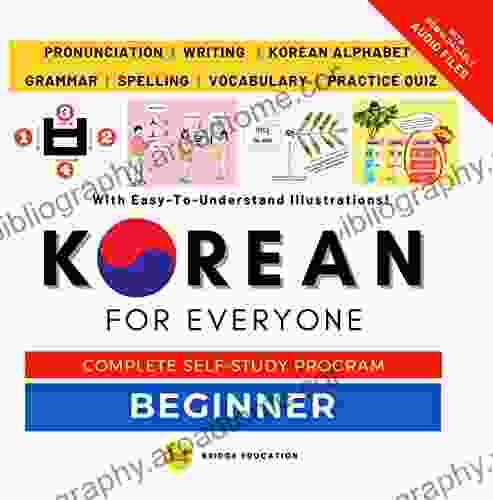
 Michael ChabonPronunciation Writing Korean Alphabet Spelling Vocabulary Practice Quiz With:...
Michael ChabonPronunciation Writing Korean Alphabet Spelling Vocabulary Practice Quiz With:...
 George R.R. MartinArt Collages On Painted Canvas: A Collector's Guide to Unique and Inspiring...
George R.R. MartinArt Collages On Painted Canvas: A Collector's Guide to Unique and Inspiring... Brian WestFollow ·10.3k
Brian WestFollow ·10.3k Stephen KingFollow ·13.7k
Stephen KingFollow ·13.7k Joe SimmonsFollow ·19.6k
Joe SimmonsFollow ·19.6k George R.R. MartinFollow ·8.3k
George R.R. MartinFollow ·8.3k Cooper BellFollow ·12.4k
Cooper BellFollow ·12.4k Larry ReedFollow ·14.2k
Larry ReedFollow ·14.2k Gavin MitchellFollow ·11k
Gavin MitchellFollow ·11k Jamal BlairFollow ·8k
Jamal BlairFollow ·8k

 Troy Simmons
Troy SimmonsStories From The Life Of Baha: A Must-Read For Spiritual...
Discover the Inspiring Teachings and Enriching...

 Wesley Reed
Wesley ReedDuke Review of MRI Principles: Case Review - Your Gateway...
Unveiling the Essence...

 Ralph Waldo Emerson
Ralph Waldo EmersonThe Big Book of NFTs: Your Ultimate Guide to the Digital...
In the rapidly evolving world of digital...
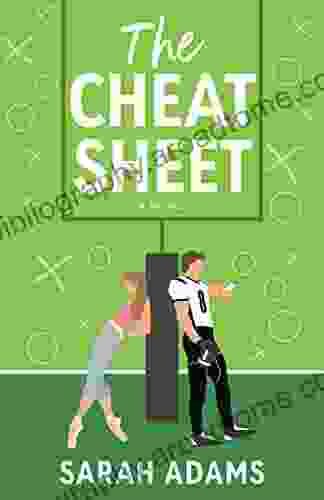
 Jason Hayes
Jason HayesUnveiling the Labyrinth: The Cheat Sheet Novel and its...
In the realm...
4.6 out of 5
| Language | : | English |
| File size | : | 1669 KB |
| Text-to-Speech | : | Enabled |
| Screen Reader | : | Supported |
| Enhanced typesetting | : | Enabled |
| Word Wise | : | Enabled |
| Print length | : | 160 pages |


